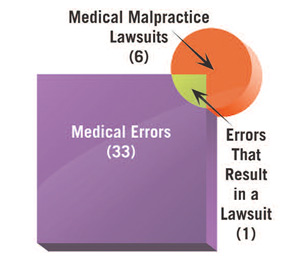Suits for procedure side effects were rare, as opposed to IM – not a surprise in a quintessential cognitive specialty such as ours. There were also no claims involving pure IM care in nonrheumatic patients or failure to diagnose cancer, suggesting that we are doing less primary care than we have done in the past. What was most striking was the high rate of medication issues that led to legal action among our physicians.

How to Avoid Lawsuits
The classic paper on malpractice by Brennan and colleagues stated that only one of six lawsuits has a medical error at its core.5 (See Figure 1) If not for medical errors, then why are physicians sued? Research suggests that reasons for suits include patient dissatisfaction with the physician’s communication skills, trying to obtain more information about their care, concern about a cover-up, and desire for remuneration.6
The first and foremost risk-management tool is a good doctor–patient relationship.7 If patients like you and they feel you were negligent, they consider it a mistake. Everyone makes mistakes. Doctors are forgiven. If they don’t like you and they feel you’re negligent, then they consider it malpractice.8 We all know of physicians who deliver poor care, yet their patients never sue because of their positive feelings toward the doctors. One needs to be alert when caring for high-risk patients (either angry or sick) – especially those who have chest, neurological, or infectious symptoms (heads, hearts, and bugs).
SLE has a striking prominence in terms of the number of cases with unusual complications. The key here is documenting well in high-risk SLE patients – those with cardiovascular, neurological, or infectious symptoms. We need also to be aware of the unusual complications that these patients can develop. Finally, given our high rate of medicine complications, thorough informed consents are vital. This would apply to steroids, leflunomide, cytotoxic drugs, and the new biologic agents. This can be a verbal consent and even a written consent in some cases. COPIC has been using a written steroid consent form for more than a decade and I suggest using it. (Download the form under the “Download Issues” tab.)
The threat of litigation is part of a modern-day physician’s existence. You can diminish your risk through awareness of why other rheumatologists have been sued. The practical behaviors I outlined above will decrease your risk of being involved in a malpractice lawsuit. Beware of heads, hearts, and bugs. Warn patients of drug toxicities and document that discussion. Most importantly, connect with your patients.